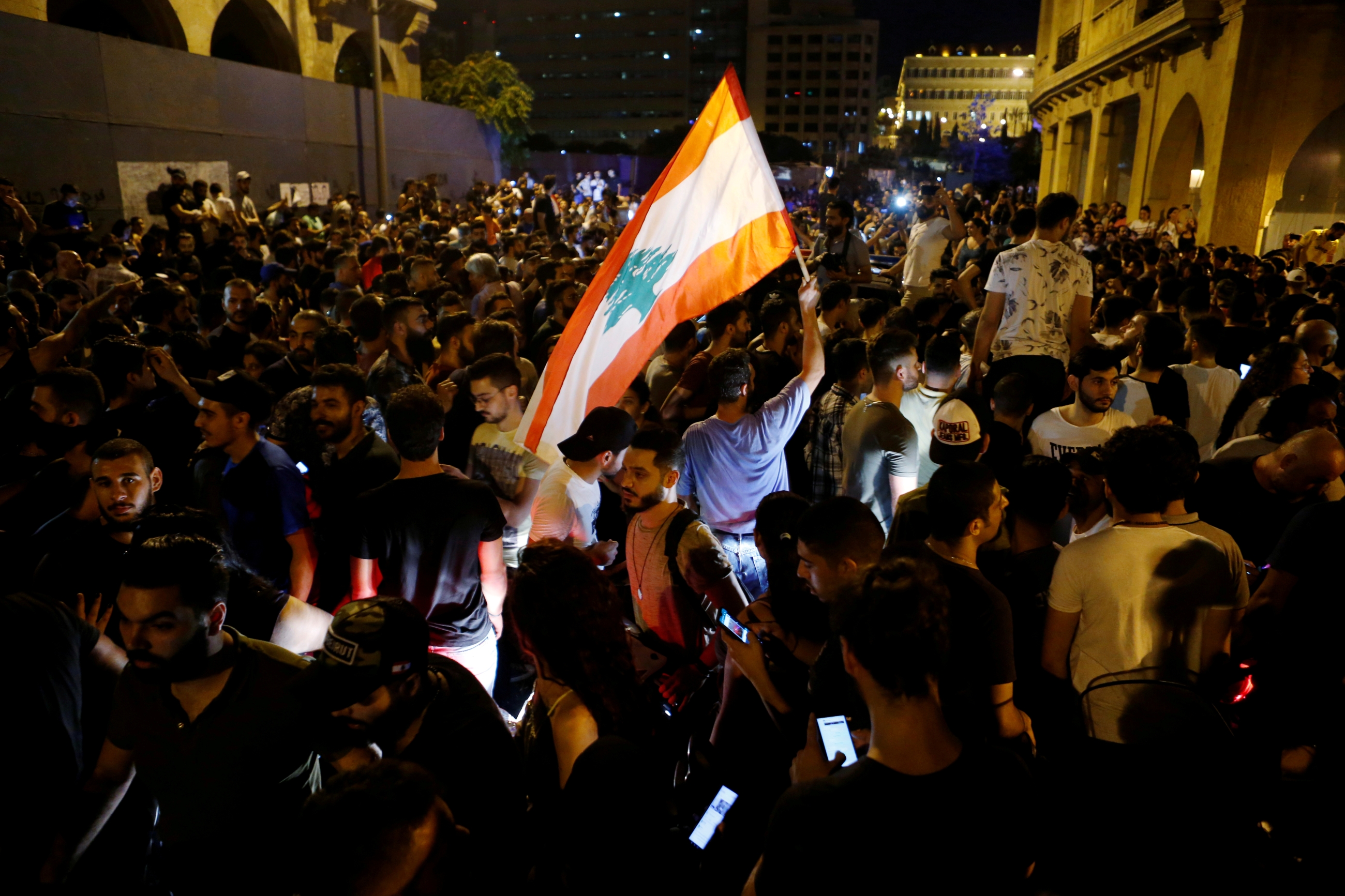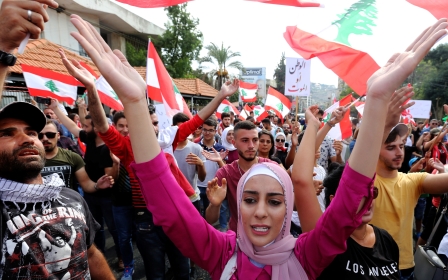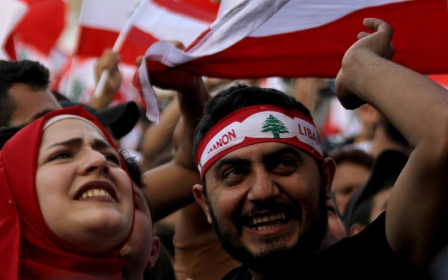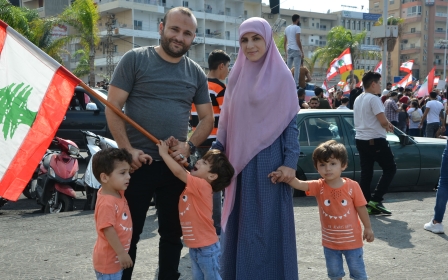Lebanese artists storm TV station angered over protest coverage

A group of artists have stormed a Lebanese television station in Beirut, protesting its perceived lack of coverage of demonstrations calling for the ouster of the ruling class and action to revive a ravaged economy.
The artists staged a sit-in at the state-run Lebanon TV on Tuesday, accusing it of ignoring six days of protests attended by hundreds of thousands across the country.
They urged the channel to become the "voice of the nation" and for the information minister, Jamal Jarrah, to be held accountable, Lebanon's Al-Jadeed channel reported.
The information minister also fired the head of the official National News Agency (NNA) Lor Suleiman on Tuesday, leading to speculations that she was terminated over the agency's coverage of the protests.
"We work in journalism, not politics," Suleiman told Aljadeed TV later in the day. "What is happening is a revolution. Citizens pay taxes and they have a right to have their voice heard. If my termination was punishment for conveying the voice of the people, I'm proud of that."
Stay informed with MEE's newsletters
Sign up to get the latest alerts, insights and analysis, starting with Turkey Unpacked
Why are the Lebanese protesting?
+ Show - HideCorruption and clientelism
Lebanon suffers under a complicated, sectarian-based power-sharing political system that has entrenched politicians and their parties in power.
Many of Lebanon's leaders are drawn from families that have dominated the political scene since its independence from France in 1943.
Parties largely claim to represent Lebanese belonging to specific confessions; parliamentary seats and top offices are divided between the 18 officially recognised sects.
However, they have largely become vehicles for corruption and clientelism and struggle to cross Lebanon's fractured political divide to reach consensus for the good of the country.
Lebanese on the streets are now calling for the removal of the entire political class.
Economic crisis
Lebanon's economy has been hit by repeated political deadlocks in recent years. Government finances are strained by a bloated public sector, debt-servicing costs and subsidising the state power producer.
Fitch ratings agency recently downgraded the country's sovereign debt, which stands at $86bn - more than 150 percent of gross domestic product - deep into junk territory.
On 2 September, Lebanon declared a state of economic emergency, vowing to speed up public finance reforms in an acknowledgement of the financial situation afflicting the country.
But the government's recent proposal of austerity measures and tax increase has angered citizens who accuse politicians of corruption, theft and leaving them behind with rising unemployment.
The crisis has caused the unofficial exchange rate to rise to 1,600 Lebanese lira to one US dollar, almost 100 lira over the officially pegged exchange rate of LL 1,507.5.
WhatsApp tax
As the Lebanese government looked to increase revenues in its 2020 budget, it decided on Wednesday to charge citizens $0.20 per day for making voice calls using online applications such as WhatsApp and Viber.
The move would have charged users $6 per month on top of already hefty telecoms bills. Lebanon has some of the highest mobile network prices in the world.
Adding to the country's list of problems - longstanding environmental crises, water and electricity shortages, crumbling infrastructure and lack of state services - is Lebanon's extremely unequal distribution of riches.
According to Lebanese newspaper Al-Akhbar, 1 percent of the wealthiest people in the country own 58 percent of Lebanon’s wealth, while the poorest 50 percent own less than 1 percent.
In a country infamous for being a fiscal haven for the ultra-rich, imposing taxes on technology used by all parts of society is a bitter pill to swallow. The government has now backed down.
Wildfires
Earlier this month, more than 100 forest fires broke out across Lebanon and the government came under heavy criticism for being unprepared to deal with the situation.
Citizens questioned why three of the country's emergency helicopters had not received maintenance work since they were purchased in 2009 at a cost of $13.9m.
Instead of firefighting helicopters, Lebanese army helicopters and civil defence teams were deployed to fight the blaze, while Cyprus, Jordan and Greece sent planes to assist.
The civil defence was forced to borrow riot control vehicles mounted with water cannons to battle the fires in the Chouf area.
The move was not well received by the Lebanese public, who criticised the government for keeping these vehicles in top condition to use against citizens during protests, instead of ensuring that life-saving equipment such as firefighting helicopters stay operational.
Chanting "criminals", protesters gathered outside the country's Central Bank to show their anger over economic policies they said have unfairly benefited the rich while dipping into the pockets of everyday people.
Protests erupted across Lebanon last week after the government announced a small tax on calls made over internet-powered phone applications, including WhatsApp.
But activists say the anger against the ruling class, which has fuelled the demonstrations, goes far beyond the so-called WhatsApp tax, which was scrapped after the first day of protests.
Banks and schools have remained closed during the ongoing demonstrations, despite a call by Minister of Education Akram Chehayeb for private and public schools, as well as universities, to resume classes on Wednesday..
For its part, the army said it was trying to negotiate to clear roads that had been blockaded by the protesters, while promising not to use force against them, Reuters reported.
"If they are convinced, so be it, if they are not, the roads will remain closed," a security source told the news agency about the promise.
Some roads were reopened in the country's south, the source added. "We will not clash with the protesters and make a problem on the ground," the source said.
On Monday, Prime Minister Saad Hariri announced a series of reforms, including the symbolic halving of minister and other lawmaker salaries, and a promise to implement measures to end corruption.
Lebanon has one of the world's highest levels of government debt as a share of economic output.
The government is made up of members of most major parties, which are run by politicians widely perceived to have mobilised state resources and influence for their own gain.
After a meeting with ambassadors from the United States, Russia, China, the European Union and the Arab League on Tuesday, Hariri said he had secured the support of foreign governments for his reforms.
Middle East Eye delivers independent and unrivalled coverage and analysis of the Middle East, North Africa and beyond. To learn more about republishing this content and the associated fees, please fill out this form. More about MEE can be found here.





